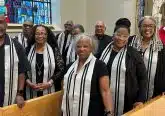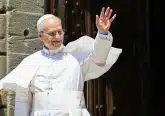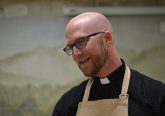Secular media coverage of papal transition, ‘mix of ignorance and malice’
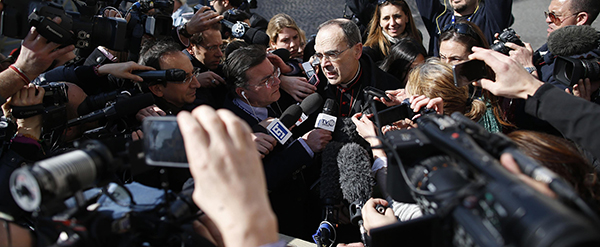
By John Stegeman
The Catholic Telegraph
The resignation of His Holiness Benedict XVI, Pope Emeritus, from the office of the papacy may go down as one of the biggest media events of 2013.
Many newspapers, radio stations and television channels devoted time and resources to covering everything from Benedict’s last day of work, to the beginning of the general congregations of the College of Cardinals. Similar coverage is expected through the conclave up to the election of a new pope.
Despite all the buzz and attention focused on the Church, many Catholics believe the secular media’s coverage has been something short of fair and balanced.
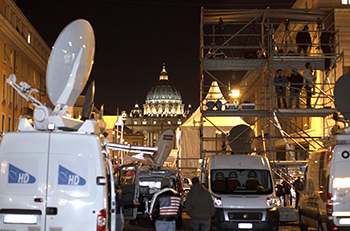
“I’m not impressed with (the coverage),” Dr. Joe Zalot, associate professor of Religious and Pastoral Studies at the College of Mount St. Joseph, said. “I think there’s a mix of ignorance and malice going on. This is what I’ve heard from other Catholic media people. What we see in the secular media for the most part is from people who just don’t have a clue. They’re not Catholic, they don’t understand how the Church works. They’re reporting what’s going to get ratings. I think there’s a certain level of malice too.”
Zalot’s comments seemed to echo the opinion of the Vatican. In late February, Vatican Press Secretary Father Frederico Lombardi denounced media coverage of the papal resignation and transition.
“There is no lack, in fact, of those who seek to profit from the moment of surprise and disorientation of the spiritually naive to sow confusion and to discredit the Church and its governance, making recourse to old tools, such as gossip, misinformation and sometimes slander,” he said in a press conference.
The information coming from the secular media has, at times, been false, or at least misleading. A international newswire story published March 4 reported that there were about 150 members of the College of Cardinals, but a Vatican press release March 1 stated there are 207. An Ohio newspaper story published last week claimed the College of Cardinals refers to those who elect the pope, as opposed to the more correct designation that the cardinal-electors under the age of 80 have that task. The College of Cardinals refers to all who hold the title of cardinal.
“What we do in the Church is so difficult to translate into secular media where they’re trying to boil it down into sound bites or boil it down to political machinations that we see in our political spectrum,” Father Kyle Schnippel, director of vocations for the Archdiocese of Cincinnati, said. “The secular media wants to talk about ‘What changes are going to be made?’ and ‘What’s going to happen?’ Those of us on the inside are going, well, ‘The gospel is going to be proclaimed. That’s what they’re going to be looking for in how to continue what Benedict and John Paul (II) have established as the Church moves deeper into the third millennium.”
As pope, Benedict XVI, urged the Church to move deeper into the third millennium via social media. The Catholic Telegraph reached out to readers via Facebook to get their reactions to the secular news media’s coverage of the Church during the resignation and interregnum.
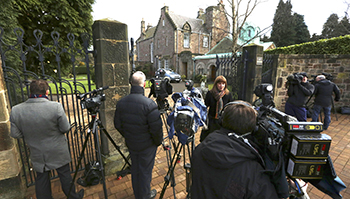
“I find it disappointing (but not surprising) that most of the secular media’s coverage I have seen has found a way to mention the allegations surrounding Cardinal (Keith) O’Brien,” Matthew Roessner wrote.
Another reader, Lisa Roa, claimed the media coverage has a political agenda.
“I think the left agenda is so barely hidden, its comical,” she wrote. “What they are really saying is they want a Pope who will allow artificial birth control, homosexual marriage and women in the priesthood. They may well know that this is not a possibility, but it makes us all look like a bunch of backwards rubes who need to get with the times.”
The negative view of the media’s coverage during the papal transition is not limited to Catholics.
“I think a lot of (the coverage) is disrespectful,” Jennifer Reed wrote. “I am not Catholic, but I do feel like the position deserves respect even if one does not agree with the Church. I am not sure why these people are so up in arms about something that has nothing to do with them.”
While most responses indicated a generally negative opinion of the secular media coverage, that viewpoint was not universal.
“Some of the media has (had) gossipy coverage of the different scandals involving priests and the pope, but for the most part, I have seen a real attempt to understand the Vatican both as a spiritual place as well as a global institution,” Karla Hollencamp wrote.
Zalot said student reaction at the College of Mount St. Joseph has been one of guarded curiosity. On that note, he’s advised students to consider media reports about the Church carefully.
“We had some really interesting discussions in class about the nuts and bolts,” he said. “I think they’re interested… I tell them, whenever you hear something in the press about anything having to do with the Catholic Church to take it with a grain of salt because 90 percent of the time its either wrong or its not accurate.”
The failings of the secular media during a time of heightened attention on the Church has highlighted the importance of the Catholic media word. International organizations like the Catholic News Service and EWTN, as well as local newspapers such as The Catholic Telegraph, provide the counterbalance to the secular media’s slant.
“When an organization like The (Catholic) Telegraph — or Sacred Heart Radio, Catholic News Service, Vatican Radio — when they’re talking about the upcoming preparations for the conclave, they get that it’s a prayerful event,” Father Schnippel said. “They get that it’s more than just electing a leader, it’s raising up a father for us. They get that its about proclaiming the gospel in the modern world. The motivations that we see and try to convey is that… That’s something that the secular media just can’t grasp.”
Information from the Catholic News Service was used in this report.










